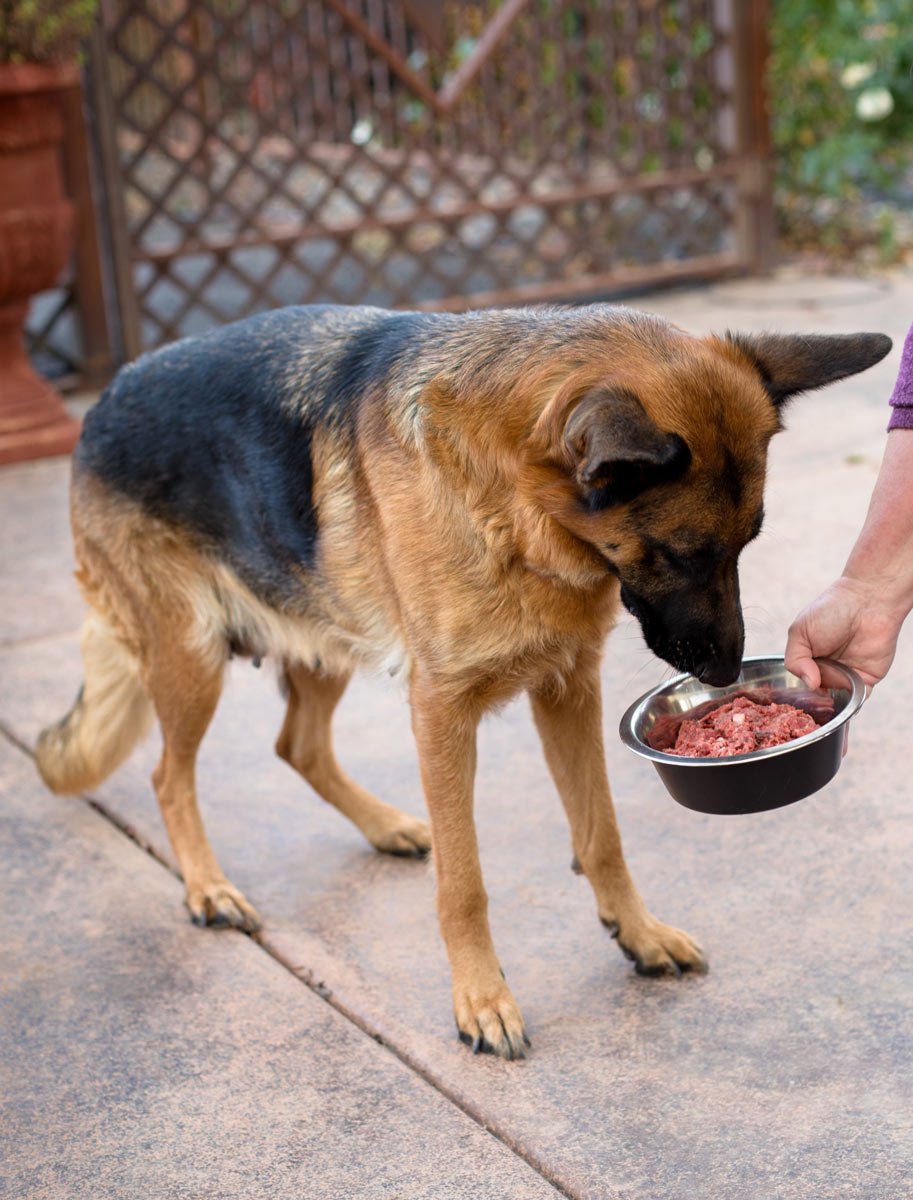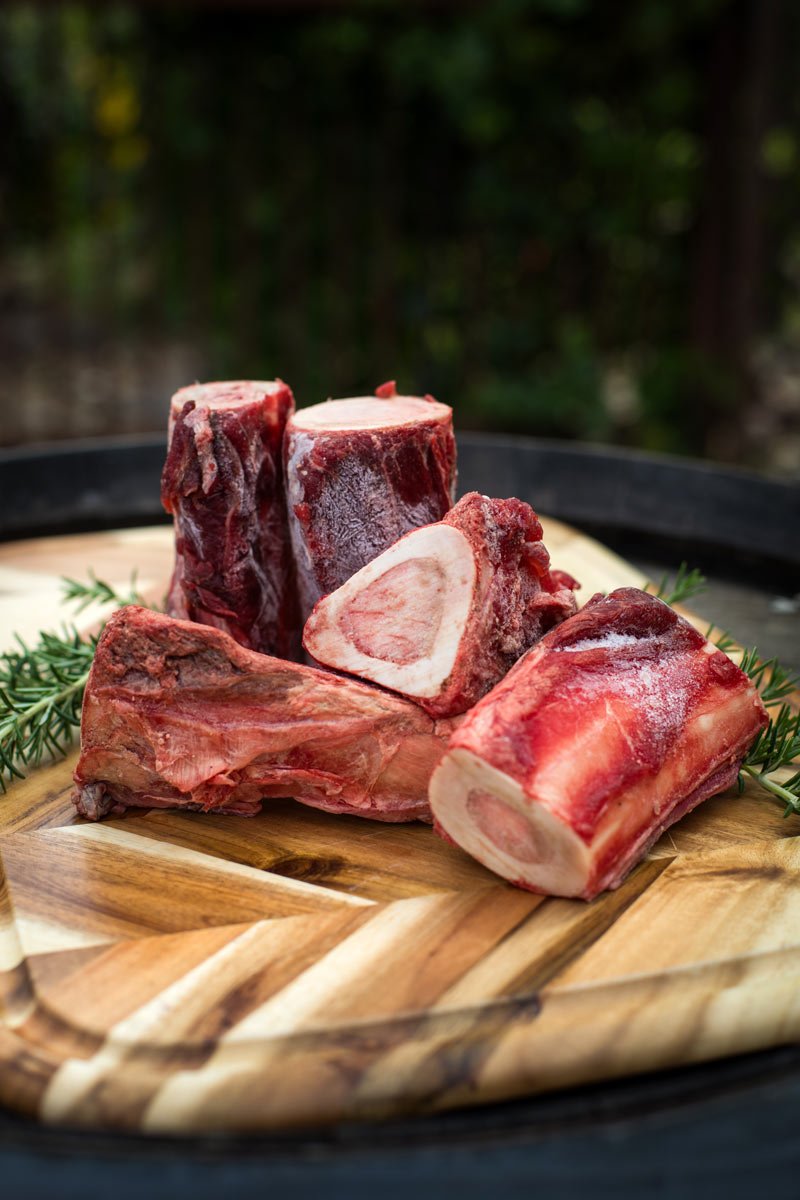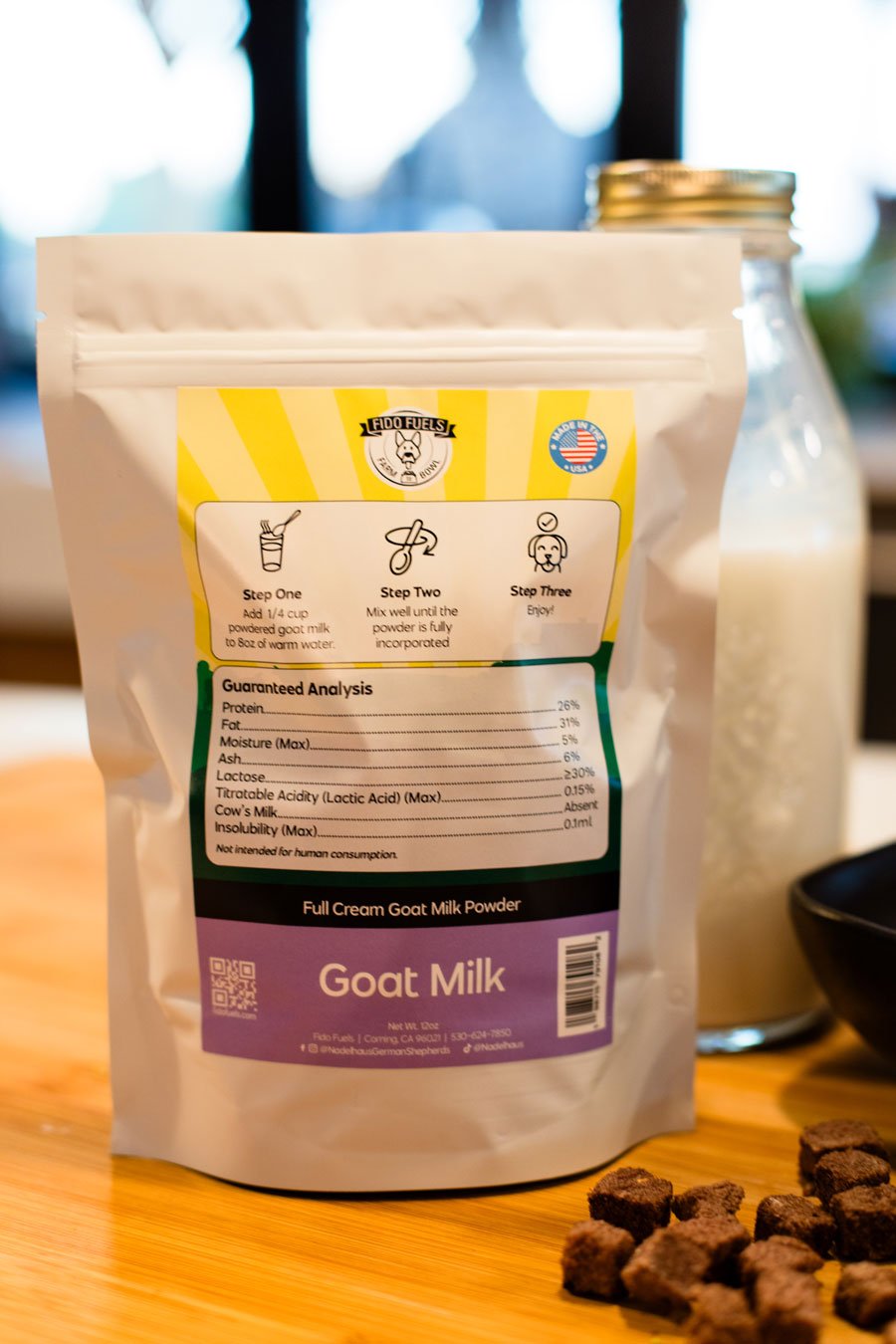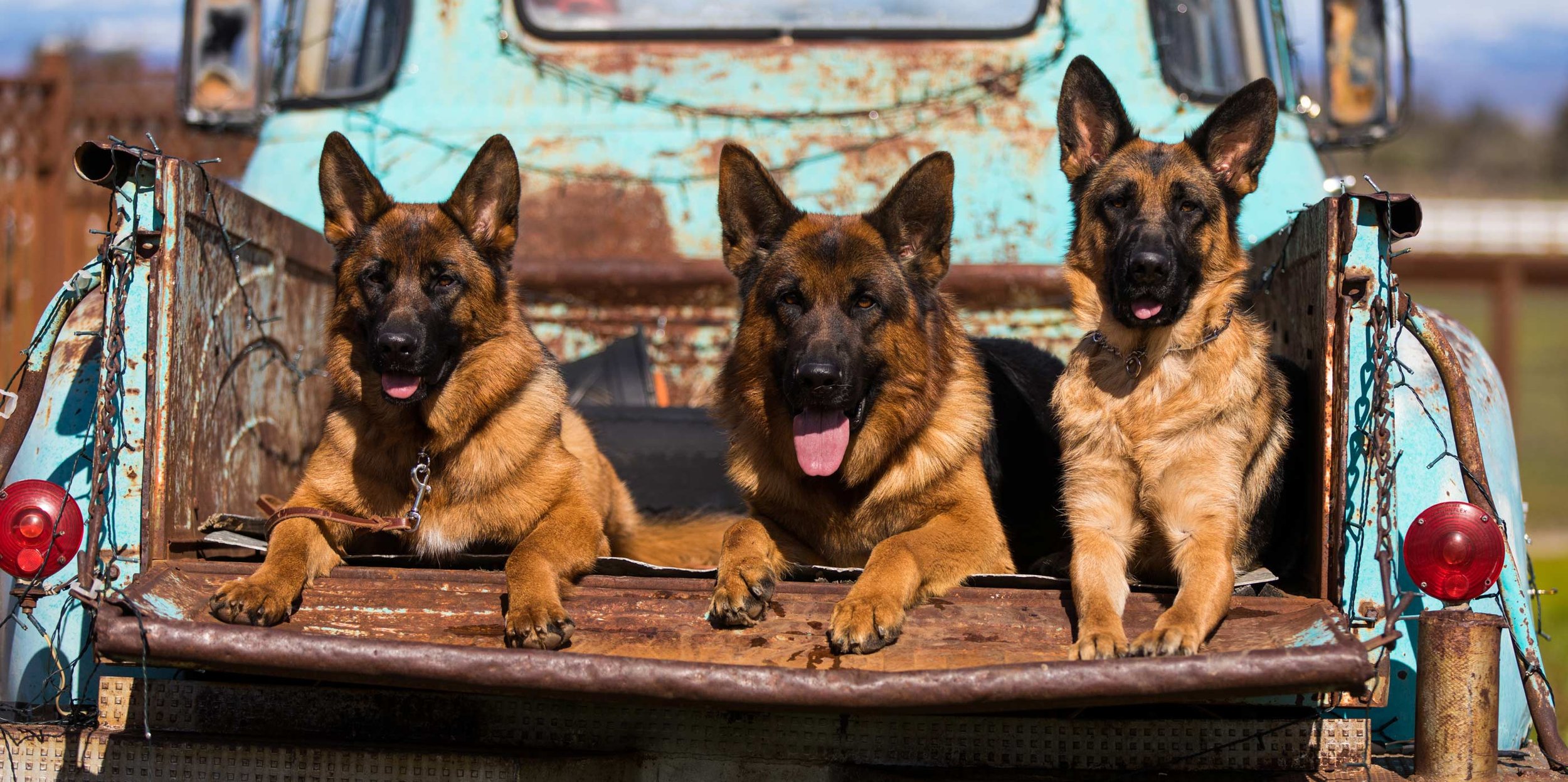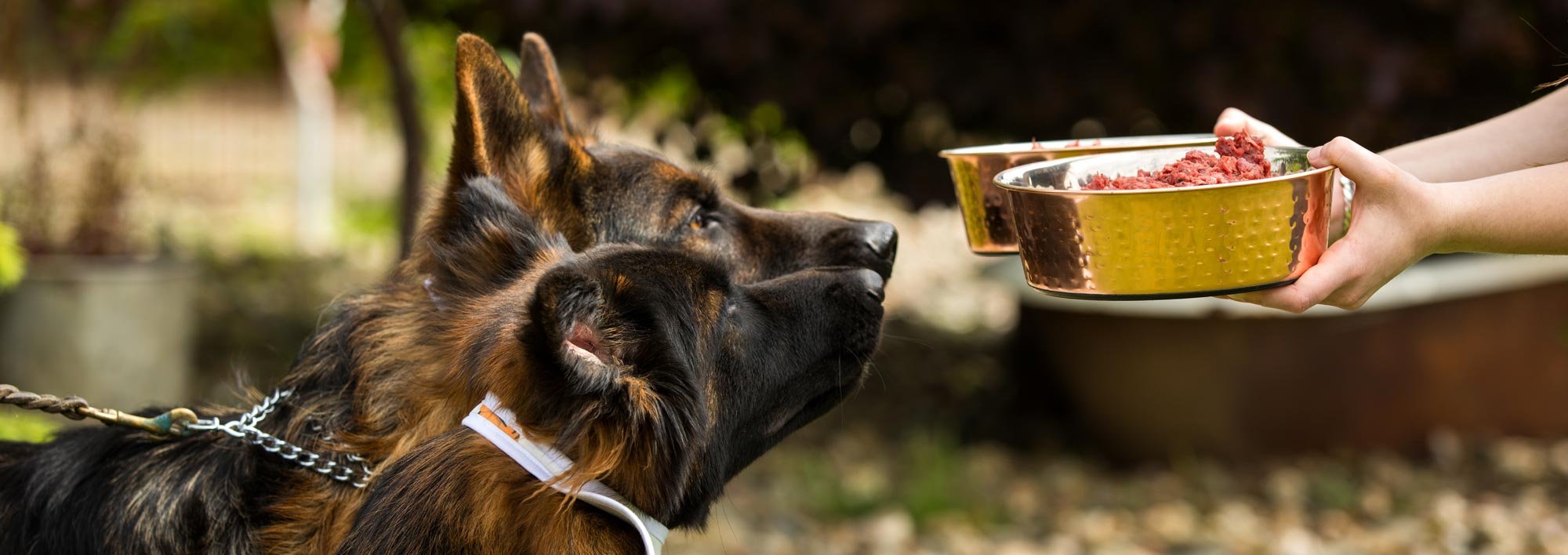
OUR BEGINNERS GUIDE TO RAW FOOD FOR GERMAN SHEPHERDS
By Traci Needles, Owner of Nadelhaus German Shepherds
Updated September 29, 2024
As devoted German Shepherd owners, we all share a common goal: to ensure our dogs lead healthy, vibrant lives. In this comprehensive guide, I'll dive into the compelling reasons why raw dog food outshines traditional dry kibble. From the amazing benefits of embracing a raw diet to the step-by-step process of transitioning your dog safely and smoothly, you're about to embark on a journey that will empower you to make the best choice for your dog's health and happiness.
WHY DID NADELHAUS SWITCH EXCLUSIVELY TO RAW FOOD FOR OUR GERMAN SHEPHERDS?
Traci Needles, owner of Nadelhaus German Shepherds, shares a personal story on why she was motivated to research and try raw food with her dogs. She now exclusively feeds her German Shepherds and puppies Fido Fuels raw food.
Is it safe to feed GERMAN SHEPHERD dogs raw food?
First off, let’s explain what we mean when talking about raw dog food. Raw dog food, often referred to as a 'raw diet,' embraces the primal essence of canine nutrition. It consists of uncooked animal meat, bones, and organs – mirroring the diet that dogs' ancestors thrived on. This unprocessed and biologically appropriate approach is gaining traction as a way to provide dogs with the nutrition nature intended.
So yes, dogs can eat raw meat safely. Dogs are carnivores by nature, and their digestive systems are adapted to process raw meat. Raw meat can provide valuable nutrients, including protein, healthy fats, and essential vitamins.
IF HUMANS can GET SICK from EATING RAW MEAT, won’t dogs get SICK too?
Dogs possess a remarkable digestive system that has evolved over millennia to thrive on raw meat. Their shorter intestinal tracts, a distinctive feature compared to humans, are finely tuned to swiftly process and extract nutrients from raw animal sources. This physiological adaptation not only enables efficient digestion but also minimizes the risk of bacterial concerns that might arise from consuming raw food. Dogs have a stomach pH level that is highly acidic, acting as a defense mechanism against harmful bacteria like Salmonella or E. coli. This unique combination of biological factors equips dogs with a robust digestive capacity, ensuring that raw meat is a natural and nourishing part of their diet.
HOW DID THE RAW FOOD MOVEMENT FOR DOGS START?
The roots of the raw food movement for dogs trace back to the pioneering work of Dr. Ian Billinghurst and his revolutionary 'Biologically Appropriate Raw Food' (B.A.R.F.) diet. In the early 1990s, Dr. Billinghurst, an Australian veterinarian, challenged conventional pet nutrition by advocating a diet based on what dogs naturally consumed in the wild. His B.A.R.F. diet emphasized raw meat, bones, and vegetables, aligning with dogs' biological needs.
Dr. Billinghurst's groundbreaking ideas resonated with dog owners who sought a more natural and wholesome approach to feeding their furry companions. The B.A.R.F. diet gained a following as anecdotes of improved health, enhanced energy, and vitality among dogs on this diet spread. This movement ignited a shift in the way people perceived canine nutrition, inspiring further research and prompting discussions about the benefits of raw food over processed kibble.
Today, Dr. Billinghurst's B.A.R.F. philosophy continues to influence the raw dog food movement, serving as a cornerstone for those who believe in providing dogs with a diet that honors their evolutionary heritage.
isn’t it simpler to just feed my GERMAN SHEPHERD kibble?
While the convenience of dry kibble is undeniable, it's essential to look beyond the simplicity and consider the nutritional value you're offering your dog. Many commercially produced kibbles often rely on lower-quality animal meat, which might include by-products, fillers, and additives rather than the premium cuts that provide optimal nutrition.
The origins of this meat can be murky, with concerns about the health of the source animals and the potential for disease transmission. Additionally, some of the animals used for kibble production are raised on GMO feed, further raising questions about the quality and potential health implications of the ingredients. Opting for a raw food diet provides a transparent, biologically appropriate alternative that prioritizes your dog's well-being.
What are the benefits of raw food for GERMAN SHEPHERDS?
Transitioning your German Shepherd to a raw food diet can yield a range of remarkable health advantages. Here are some key benefits that set raw food apart from conventional kibble:
Enhanced Nutrient Absorption
Raw food's minimal processing retains vital enzymes and nutrients, allowing your dog's digestive system to efficiently absorb the maximum benefits. This can contribute to improved energy levels, better organ function, and overall vitality.
Healthy Skin & Coat
The omega-3 fatty acids found abundantly in raw food have proven skin-soothing and coat-enhancing properties. By addressing issues like dry skin and excessive shedding, a raw diet can give your dog a glossy coat and healthy skin, indicative of their inner well-being.
Improved Digestion
Raw food's natural enzymes promote efficient digestion, potentially reducing common digestive problems like bloating, gas, and upset stomach. This ease of digestion often translates to firmer stools, another indicator of your dog's overall health.
Reduced Allergies
Raw diets can alleviate allergies in some dogs, primarily due to the elimination of common allergens found in commercial kibble. By avoiding potential triggers like grains, artificial additives, and low-quality proteins, many dogs experience relief from itching, redness, and other allergy-related discomforts.
Smaller Dog Stools
One of the pleasant side effects of a raw diet is the reduction in stool size for German Shepherds. This phenomenon is a result of better nutrient absorption, leaving less waste for your dog to eliminate. Smaller stools are not only less for your to clean up, but also indicate that your dog is utilizing the food they consume more efficiently.
Cleaner Teeth
Raw food diets often include bones, which act as natural dental cleaning tools. Chewing on bones helps remove plaque and tartar buildup, promoting healthier gums and fresher breath. It's a simple and effective way to support your dog's oral hygiene.
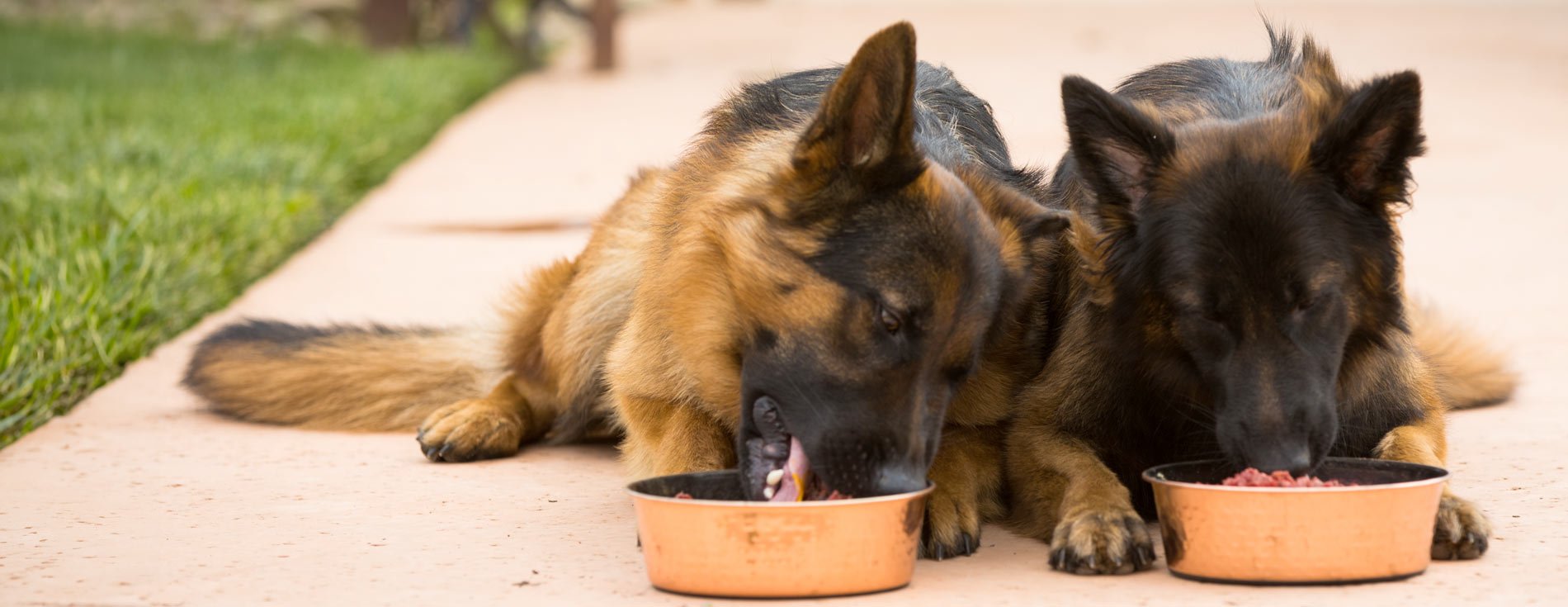
NADELHAUS IS AN OFFICIAL RESELLER OF FIDO FUELS RAW DOG FOOD
Wait, so my GERMAN SHEPHERD can eat raw bones?
Yes, many dogs can safely eat raw bones. Raw bones are often considered safe for dogs because they are softer and more pliable than cooked bones. They are easier for dogs to chew and break down, and they can provide dental benefits by helping to clean their teeth.
However, it's important to choose the right type and size of bones for your dog. Large, meaty bones from animals like beef or lamb are generally safer than small, brittle bones. Avoid very small bones that could be a choking hazard or bones that are prone to splintering, as these can pose a risk to your dog's health.
NOTE: You should never feed your dog cooked bones, as they can become brittle and cause harm to your dog or cause a choking risk.
isn’t the fda against raw food for dogs?
Dr. Andrew Jones, DVM, shares his thoughts in this video on why the FDA seems to be unfairly targeting the raw pet food over dry kibble and pet food companies.
“The FDA’s concern that raw pet food is so much more dangerous than kibble is not accurate. If you look at historical records since 2012, and you’re looking at what pet food has been contaminated with salmonella this dry kibble is 75 times more likely to be contaminated with salmonella than this supposed risky pet food, this raw pet food. 70 times more likely? The FDA spent nearly $1 million dollars regulating this raw pet food which accounts for 1% of the market, completely ignoring the thousands and thousands of other pet foods and other pet food companies, producing this kibble and causing array of harm.”
what about FRUITS and vegetables? will my dog need those on a raw diet?
This is a hotly debated question in the world of raw food for dogs. You can read this detailed article featuring both sides of the vegetable debate.
At Nadelhaus, we sell both the Fido Fuels Raw Beef & Ground Bone Blend and the Harvest Blend, which is the same beef and ground bone blend, but with added fruits and vegetables. The Harvest Blend features the following super foods: broccoli, blueberries, sweet potatoes, carrots and apples. This blend of fruits and vegetables offers a wealth of vitamins, antioxidants, and fiber, supporting your dog’s overall health, aiding digestion, boosting immune function, and promoting a healthy coat.
Foods that are dangerous for german shepherds
Whether you’re feeding your German Shepherd raw or kibble, you should always avoid the following foods as they are dangerous for your pet:
Onions, garlic, and chives
Grapes and raisins
Chocolate or coffee
Avocado
Citrus
Apple seeds or the pits to any fruit
Xylitol (artificial sweetener that is toxic to pets)
Macadamia nuts and walnuts
Introducing Fido Fuels Freeze-Dried Raw Beef & Ground Bone Dog Food
Enhance your dog’s nutrition with Fido Fuels Freeze-Dried Raw Beef & Ground Bone Blend, the optimal selection for your dog’s overall health. Made with the same raw beef & ground bone blend, our freeze-drying process locks in the natural flavors and nutrients of the raw ingredients while providing a convenient, shelf-stable product. Fido Fuels Freeze-Dried Raw Beef & Ground Bone Blend underscores our dedication to comprehensive canine nourishment, merging all-natural, pure components into a filling and easy to serve meal.
okay, i’m convinced. how do i transition my german shepherd from kibble to raw food?
Your decision to transition from dry kibble to raw dog food is a proactive step towards enhancing their overall well-being. To ensure a smooth and successful transition, consider the following steps:
SLOW AND GRADUAL TRANSITION TO RAW - Start by introducing a small portion of raw food alongside your dog's regular kibble. Over the course of a week or two, gradually increase the proportion of raw food while decreasing the kibble amount.
OBSERVE AND ADJUST THE DIET - Pay close attention to your dog's response to the new diet. Monitor their digestion, energy levels, and overall behavior. If any digestive issues arise, you might need to slow down the transition or make adjustments to the types of raw food you're offering.
CONSISTENCY AND SLOW INTRODUCTION TO OTHER PROTIENS - As your dog begins to settle into its new diet, slowly start to introduce different types of raw meat, including beef, poultry, and fish, to provide a balanced range of nutrients. Introduce new proteins 1-2 weeks apart to give your dog time to adjust to the new type of raw food. Maintain a consistent feeding schedule to help your dog adjust to their new routine.
ADD SUPPLEMENTS FOR A BALANCED DIET - While raw dog food provides a wealth of nutrients, consider incorporating dog supplements rich in vitamins, antioxidants, and immune-boosting properties. These supplements can offer anti-inflammatory benefits, enhance your dog's immune system, and contribute to their overall vitality. View King Kanine wellness supplements.
Traci Needles, owner of Nadelhaus German Shepherds, shares a personal story on why she was motivated to research and try raw food with her dogs. She now exclusively feeds her German Shepherds and puppies Fido Fuels raw food.
what kinds of raw meat can i feed my german shepherd?
You can feed your German Shepherd a variety of raw meats as part of a balanced raw diet. Here are some safe options:
BEEF - Lean cuts of beef, such as ground beef, beef chunks, or beef heart, can be included in your dog's diet.
POULTRY - Chicken, turkey, duck, and other poultry are good choices. Be sure to remove any bones that are too small or brittle.
LAMB - Lean lamb cuts provide protein and nutrients. Lamb organs like liver and kidney can also be included in moderation.
FISH - Fish like salmon, mackerel, and sardines are excellent sources of omega-3 fatty acids. Ensure the fish is deboned and doesn't contain added seasonings.
PORK - Lean cuts of pork can be fed, but avoid fatty parts. Pork organs like liver and heart can also be part of the diet.
GAME MEATS - Meats like venison, bison, elk or rabbit can provide variety and nutrition.
EGGS - While not a meat, eggs are a nutrient-rich addition to your dog's diet, offering high-quality protein, essential vitamins and minerals, healthy fats, antioxidants, and nutrients like choline. You can feed them raw or lightly cooked. Make sure to include the shell, which provides calcium.
When feeding raw meat to your dog, consider their size, age, and dietary needs. It's essential to offer a balanced diet that includes a variety of muscle meat, along with bones, organs, and possibly vegetables or a supplement for additional nutrients. Always prioritize food safety by choosing high-quality, human-grade meat and practicing proper handling and hygiene.
A Nadelhaus German Shepherd eating its raw dog food.
how much raw food should i feed my dog?
Aim to feed your dog a daily amount of raw food equally around 2-4% of the dog’s body weight. When transitioning, feed raw portions at the same times you would normally feed your dog its kibble. Larger dogs may need closer to 4% and smaller dogs may need less.
A 80 pound dog should eat between 1.5 to 3.2 pounds per day, or 11 to 24 pounds per week
A 60 pound dog should eat between 1.2 to 2.4 pounds per day, or 8 to 18 pounds per week
A 40 pound dog should eat between 0.8 to 1.6 pounds per day, or 5.5 to 12 pounds per week
A 25 pound dog should eat between 0.5 to 1 pounds per day, or 3.5 to 8 pounds per week
A 10 pound dog should eat between 0.2 to 0.4 pounds per day, or 1.5 to 4 pounds per week
Keep in mind that these are general guidelines and individual food needs can vary. Monitor your pet closely and adjust the food quantity as necessary to maintain a healthy weight.
FIDO FUELS RAW DOG FOOD FEEDING INSTRUCTIONS AND PORTION RECOMMENDATIONS
SHOP FOR RAW DOG FOOD for german shepherds
Nadelhaus sells 100% all-meat dog food made from beef, ground bones and organ meat. We ship to all lower 48 U.S. states!
should i give my GERMAN SHEPHERDS supplements when it’s on a raw food diet?
So you’re considering feeding your German Shepherd a raw diet, but you’re wondering about dog supplements. Our answer is straightforward: to ensure your dog's holistic health, yes, supplements can be beneficial. At Nadelhaus, we feed our German Shepherds goat milk and King Kanine supplements, which are tailored to complement a dog's raw diet, enriching it with essential vitamins, anti-inflammatory properties, immune system support, and potent antioxidants. These can enhance your dog's raw food journey, providing them with the nutrition they truly need.
FIDO FUELS POWDERED GOAT MILK
Boost your dog's nutrition with Fido Fuels Powdered Goat Milk, a 100% natural and nutrient-rich supplement designed to enhance your pet's overall health and well-being. Made from pure goat milk, this powdered formula is easy to prepare and offers a convenient way to provide your dog with the benefits of fresh goat milk, without the hassle of refrigeration. Simply mix 1/4 cup of powdered goat milk with 8 ounces of water, and you’ll have a delicious, nourishing treat that dogs love.
King Kanine Green Immune
This is best for overall balance if feeding your dog a raw, all-meat diet. This cutting edge combination is the perfect support system for canine joints, skin and coat care and antioxidative health. Rich in glucosamine and chondroitin, Vitamins C and E, antioxidants, and minerals such as copper, zinc and selenium for your pets best overall wellness.
King Kanine Strong
This is best for probiotics and protein. This formula includes protein sourced from hemp seed casings, promoting muscle support. Additionally, the inclusion of turmeric and piperine helps support joint health and reduce inflammation for dogs suffering from arthritis or joint pain. The presence of acidophilus and thermophilus promotes gut and intestinal health, while also boosting immune function for overall wellness.
King Kanine Mushroom Plus
Harness the power of mushrooms with this 7 Mushroom Blend + Chia Seeds. Holistically formulated to supplement any pets diet with essential minerals, nutrients, and enzymes that can treat a variety of health issues.
Learn more about the health benefits of mushrooms for dogs in our comprehensive guide on mushroom supplements for dogs.
ABOUT THE AUTHOR
Traci Needles is the founder and owner of Nadelhaus German Shepherds™. Traci has been breeding German Shepherds since 1996. With nearly 30 years of experience with German Shepherds, she has extensive knowledge about this incredible working dog breed. Her mission is to breed German Shepherd dogs that have the ability to obtain Schutzhund titles and the highest possible conformation ratings. The German Shepherds she breeds are from 100% German bloodlines and Nadelhaus is a member of the GSDCA-WDA and SV of Germany.
All information presented on this website is for informational and/or educational purposes only and based on Traci Needles’ personal experience of breeding German Shepherd dogs for nearly 30 years. These statements have not been evaluated by a veterinarian. This website is not intended to diagnose, treat, cure, or prevent any disease and is not intended to be a substitute or replacement for any medical treatment. Please seek the advice of a veterinarian for your dog’s specific health concerns.
MORE ARTICLES FOR GERMAN SHEPHERD and dog OWNERS

